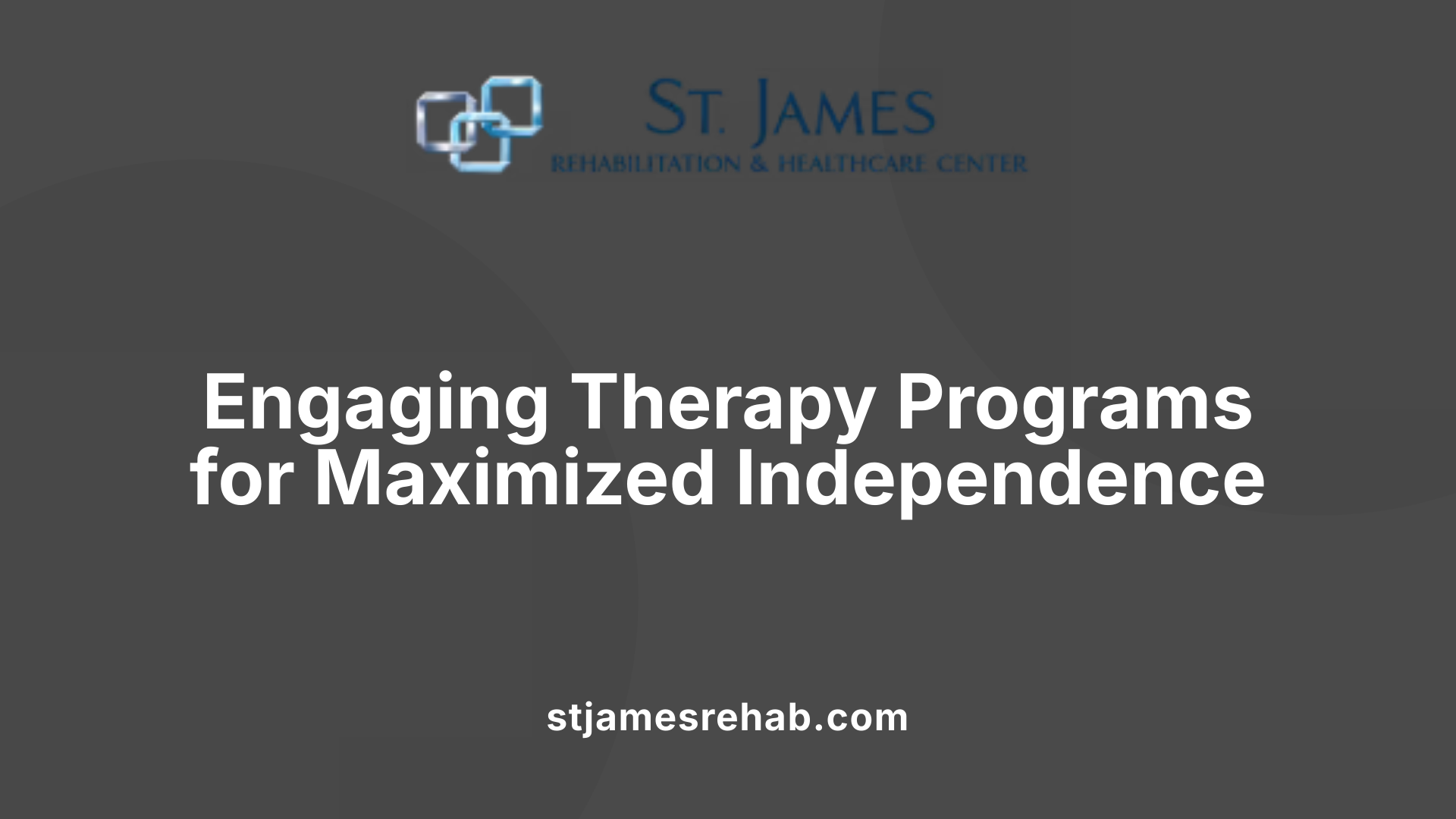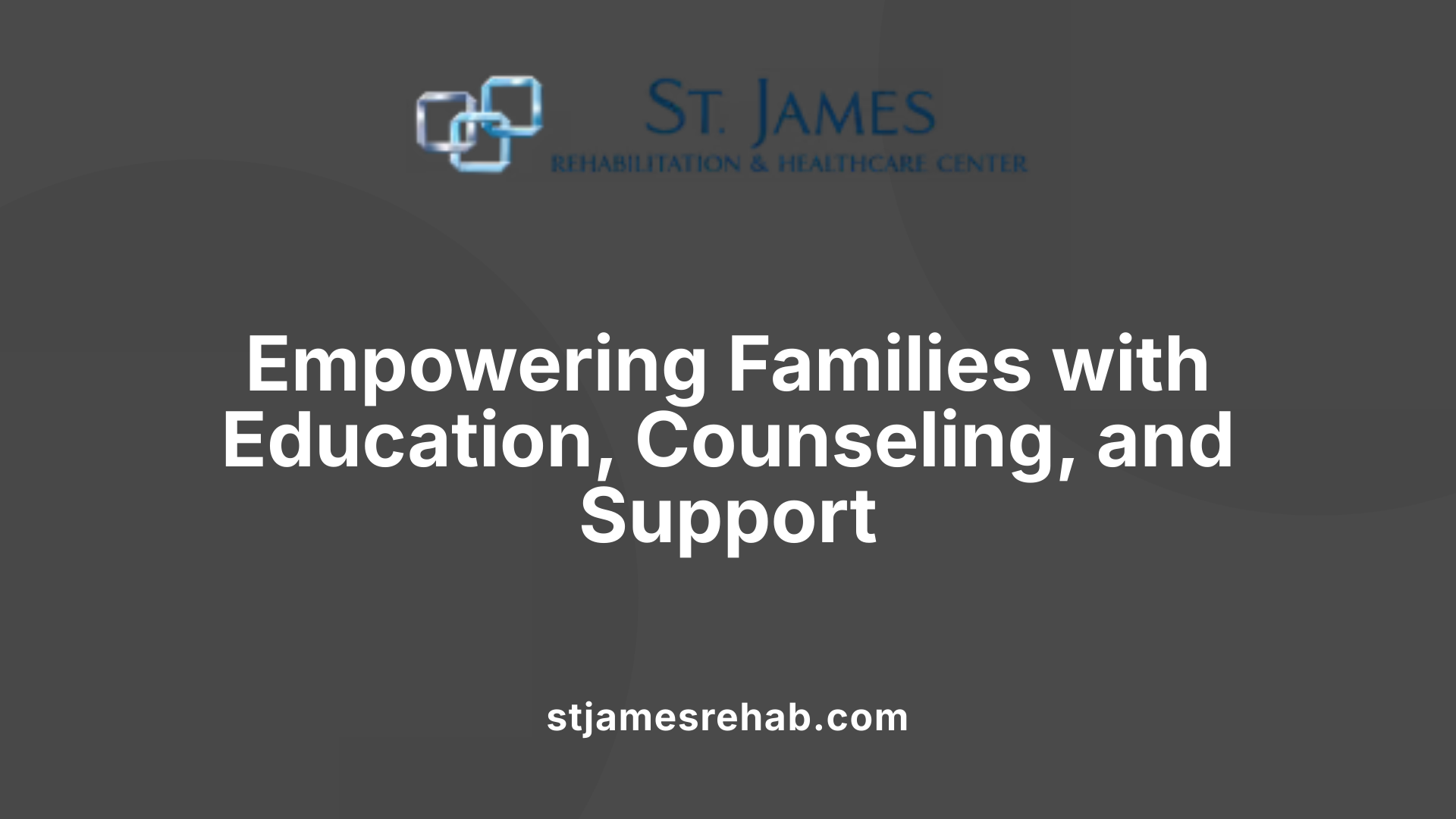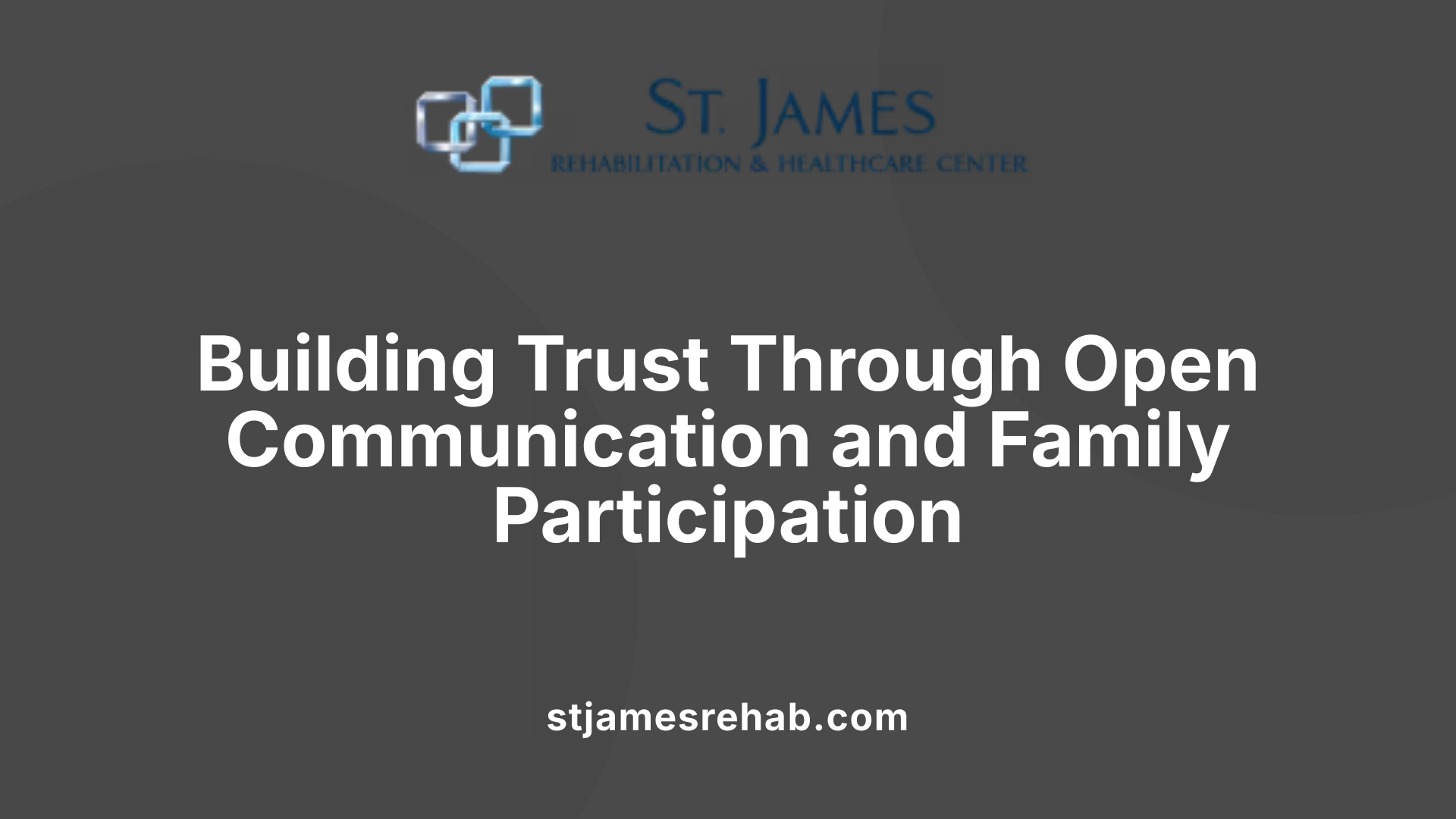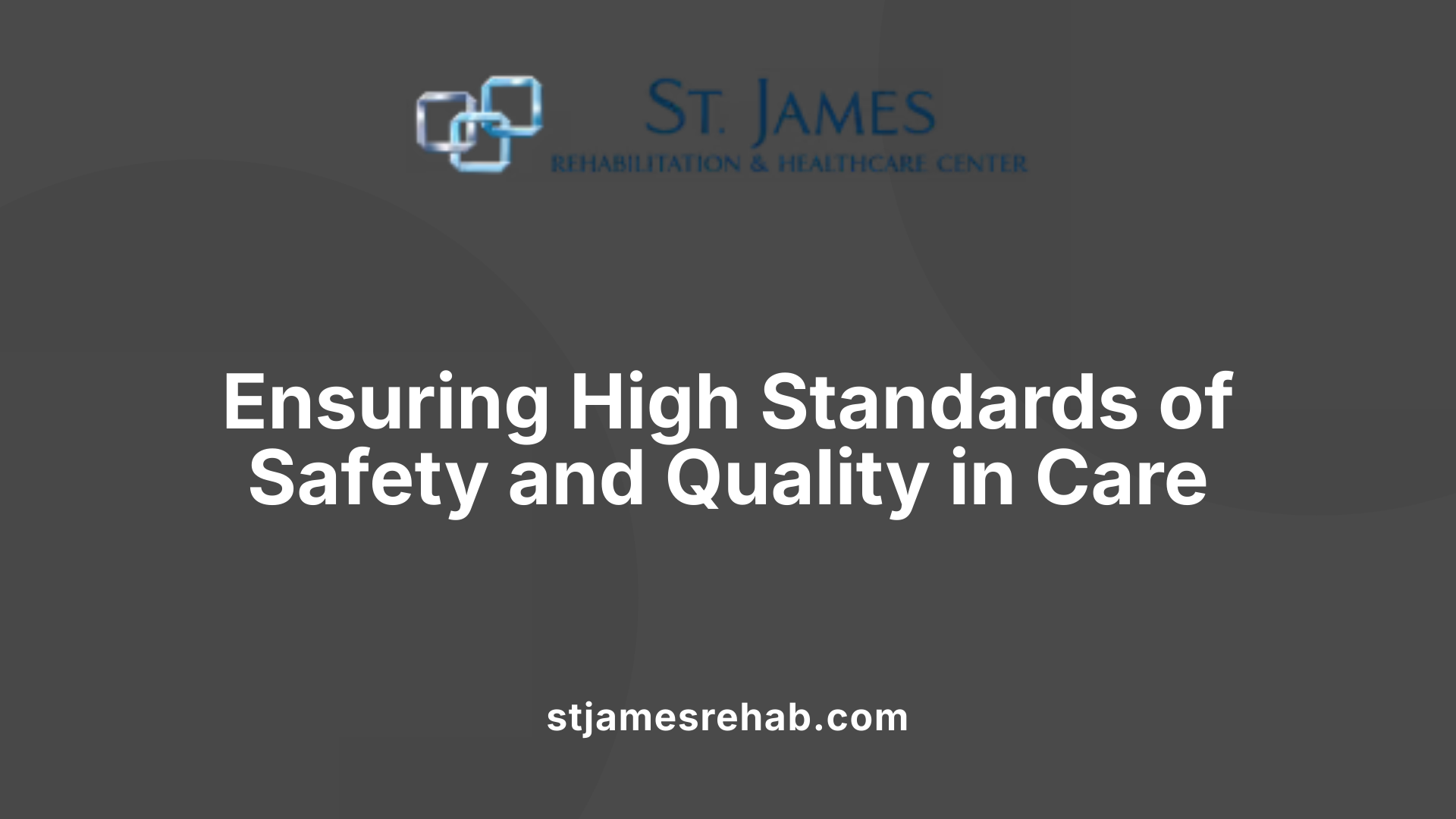How St. James Rehab Provides Comprehensive Support for Families
Supporting Families Throughout the Healing Journey at St. James Rehab

A Holistic Approach to Family-Centered Care
St. James Rehab is dedicated to inclusive and compassionate care, emphasizing the vital role families play in the recovery and well-being of their loved ones. Through a variety of services and support mechanisms, the facility ensures that families are active partners in the rehabilitation process, fostering a nurturing environment that promotes emotional stability and comprehensive healing.
Comprehensive Rehabilitation and Family Engagement
 At facilities like St. James Parish Hospital and St. James Place, a focus on personalized care and therapy programs ensures that residents and patients receive comprehensive support throughout their recovery journey.
At facilities like St. James Parish Hospital and St. James Place, a focus on personalized care and therapy programs ensures that residents and patients receive comprehensive support throughout their recovery journey.
Services such as physical, occupational, and speech therapies are tailored to meet individual needs. Skilled therapists assess each person’s abilities and design active, engaging treatment plans that include therapeutic exercises, training for daily activities, and education for patients and their families. This collaborative approach helps maximize recovery and promotes independence.
Family participation is highly encouraged during the rehabilitation process. Involving loved ones in care planning and therapy sessions provides emotional reassurance to patients and helps caregivers understand how best to support ongoing recovery at home. Regular communication between families and care teams, including weekly meetings, ensures everyone stays informed and engaged.
Supporting families is vital, especially during the transition to home care. Many centers, including St. James, assign dedicated representatives to help ease this shift by providing clear information and coordinating services. This ensures that families feel confident and prepared to assist their loved ones post-discharge.
Why is family support important during the rehabilitation process? Family involvement offers emotional strength, encouragement, and motivation. It helps boost self-esteem and fosters a sense of security, which encourages patients to stay engaged in their therapy. Moreover, families often assist with everyday care, environmental modifications, and adherence to treatment plans, all of which contribute significantly to successful recovery.
What role does family involvement play in the rehabilitation of patients with disabilities or after strokes? It provides emotional backing and helps maintain motivation. Families working closely with healthcare providers can reinforce therapy goals and celebrate small victories, building confidence and independence in patients. Active participation in medical decisions and ongoing support can improve treatment adherence, making recovery smoother.
Overall, integrating family into rehabilitation programs creates a supportive environment — essential for emotional resilience and tangible healing outcomes. Centres like St. James excel in fostering this participation, ensuring that families are part of the journey towards restored health and independence.
Below is a summary table highlighting aspects of family-focused care:
| Aspect | Description | Benefits |
|---|---|---|
| Personal Care Assistance | Families are involved in daily care routines | Enhances comfort and confidence |
| Treatment Planning | Family members participate in decision-making | Promotes understanding and adherence |
| Post-Discharge Support | Families receive guidance for home care | Ensures continuity of recovery |
| Emotional Support | Families provide motivation | Boosts recovery motivation and mental health |
For further details, you can search
Family Support Programs and Resources at St. James

How does family support contribute to addiction recovery?
Family support plays a vital role in addiction recovery by providing a stable, nurturing environment that encourages emotional stability and reduces relapse risks. At St. James, families are actively involved through education, counseling, and participation in care planning. Open communication built on empathy and trust enables family members to share concerns, recognize progress, and address setbacks compassionately.
Family therapy is a cornerstone at St. James, helping loved ones learn coping skills, understand addiction's impact, and strengthen relationships. This process often includes setting healthy boundaries and participating in support groups, which helps manage stress and sustains sobriety.
Ultimately, positive family dynamics foster resilience and healing, making long-term recovery more attainable. Involving families in the recovery journey not only benefits the individual but also promotes a supportive environment that encourages lasting sobriety.
What is family therapy in rehab?
Family therapy in rehab is a targeted approach where family members or couples work together under a therapist’s guidance to improve communication, resolve conflicts, and understand addiction's effects on the family system. It aims to reduce stress, increase coping mechanisms, and restore trust among members.
The therapy sessions can involve the entire family or individual members and are tailored to address specific issues related to addiction. Whether conducted in inpatient, outpatient, or virtual settings, family therapy at St. James aims to educate families about addiction, recognize unhealthy patterns, and develop new responses and boundaries.
This supportive therapy helps rebuild relationships, fosters understanding, and enhances the recovery process. It ensures that families are equipped to support their loved ones effectively, both during treatment and after discharge.
Family programs at St. James
| Service Type | Description | Benefits |
|---|---|---|
| Family Education | Offers information about addiction and recovery process | Empowers families to understand and support their loved ones |
| Counseling & Therapy | One-on-one and group therapy sessions for families | Facilitates communication, resolves conflicts |
| Care Planning Involvement | Families participate in creating individualized care plans | Ensures family insights are integrated into treatment |
| Discharge & Post-Care Support | Guidance for ongoing recovery and home management | Promotes sustained sobriety and reduces relapse |
St. James emphasizes the importance of family engagement as part of its comprehensive treatment approach. Families are encouraged to be active participants, understand the treatment process, and develop skills to support their loved ones’ recovery journey.
Creating a Supportive Environment for Families

How are families involved in the care process at St. James Rehab?
Families play a vital role in the care and recovery journey at St. James Rehab. They are warmly welcomed every day, with visitation policies encouraging family members to see their loved ones in action and actively participate in their care. This openness helps foster trust and reassurance among families.
The facility emphasizes transparent communication and provides weekly updates during care team meetings. These sessions are designed to keep families informed about progress, address concerns, and adapt care plans as needed. Such regular interactions ensure that families are engaged and confident in the treatment process.
What support systems and resources are available to families during a loved one's rehabilitation or care process?
Families are supported by a comprehensive network of resources at St. James. They are encouraged to take part in social, cultural, and recreational activities alongside residents, creating a community atmosphere that benefits all involved.
The facility offers a dedicated Resident Priority Program Representative for each resident, who assists families with the transition into skilled nursing care and helps navigate the process smoothly. This personalized support ensures families feel informed, valued, and prepared for each step of their loved one’s care.
How does the facility ensure it meets family needs and provides a supportive environment?
St. James Rehab’s commitment to family support is reflected in its award-winning care standards and community engagement initiatives. The environment is designed for comfort, with amenities that facilitate easy visits and family involvement.
By maintaining open communication channels, fostering respectful relationships, and involving families in recreational activities, the facility creates a partnership model. This approach ensures that families’ needs are consistently met, promoting a shared focus on the well-being and successful recovery of their loved ones.
The Quality and Safety of Family-Inclusive Care

How does the facility ensure high standards of care and safety?
St. James offers an environment where safety and quality are top priorities. The facility is equipped with 24-hour emergency call systems, ensuring help is always available for residents. Care teams include skilled nurses, doctors, and therapists who follow strict safety protocols to prevent accidents and manage health emergencies promptly.
Patients and residents benefit from personalized care plans, regularly reviewed by a multidisciplinary team. These plans incorporate individual health needs and safety considerations, reducing the risk of complications and promoting well-being.
What awards and recognitions highlight community and service excellence?
St. James has been recognized for its outstanding service and community contribution. It received the 2024 U.S. News & World Report Best Long-Term Care Award, a testament to its high standards in nursing and resident care.
In addition, it was named a 2025 Best Independent Living community, emphasizing its dedication to creating a vibrant, supportive environment for residents. The facility has also been awarded for its excellence in food, dining, and recreational activities, underscoring a holistic approach to well-being.
How are patient and family satisfaction ratings evaluated?
Resident and family satisfaction is reflected in the facility’s high discharge-to-home rate, which surpasses the national average. This indicates effective care and successful transitions back into the home environment.
Visitors are welcome daily, and families are encouraged to observe care in action. The facility maintains open communication channels, including weekly care team meetings involving families. This transparency fosters trust and helps families stay informed and involved in their loved ones’ care.
How does the facility support families and ensure a nurturing environment?
St. James’s approach includes personal touches like pairing each resident with a Resident Priority Program Representative. These representatives assist families through the transition into skilled nursing care, providing clarity and support.
Social, cultural, and recreational activities are actively encouraged, promoting social engagement and emotional health. Resident and family participation in care planning further strengthens the supportive atmosphere.
| Aspect | Details | Additional Notes |
|---|---|---|
| Safety Measures | 24-hour emergency call systems | Ensures immediate assistance for residents |
| Recognition | U.S. News Awards | Reflects community service and quality standards |
| Family Involvement | Open visitation, family meetings | Promotes transparency and trust |
| Resident Satisfaction | High discharge-to-home rates | Indicates effective, supportive care |
| Community Environment | Award-winning amenities | Fosters an engaging, nurturing atmosphere |
A Commitment to Family-Centered Healing
St. James Rehab exemplifies a holistic, family-oriented approach to recovery and long-term care. By integrating comprehensive support programs, encouraging active family involvement, and maintaining high safety and quality standards, the facility ensures that families are empowered to participate fully in the healing process. Through recognized excellence and dedicated resources, St. James Rehab continues to set a benchmark in providing compassionate, effective, and inclusive patient care that places families at the center of recovery.
References
- About Us - Chateau St. James Rehab & Retirement
- Nursing / Skilled Care - St. James Place
- Treatment Centers and Rehab in Saint James, NC - Psychology Today
- Therapy & Rehab – 225.258.5934 - St. James Parish Hospital
- Physical Therapy in St. James, Minn. - Mayo Clinic Health System
- St. James House – 55 years of serving older adults
- Swing Bed/Skilled Nursing – 225.258.5936 - St. James Parish Hospital
- Family Therapy for Addiction Treatment
- National Helpline for Mental Health, Drug, Alcohol Issues - SAMHSA





